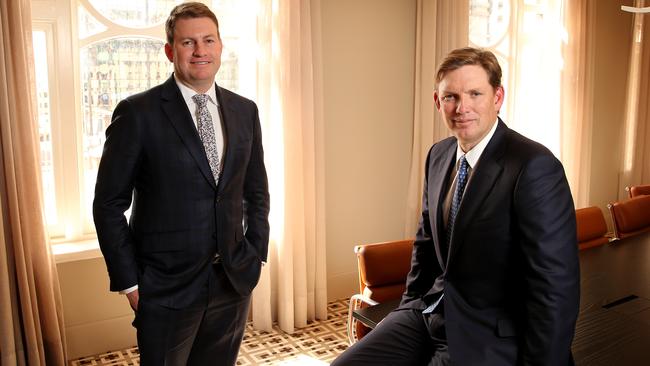Dixon Advisory clients urged to accept deed to recoup fraction of their investments
Dixon Advisory administrators have urged clients of the collapsed wealth management firm to accept a deed that will see them repaid a fraction of their investment.

Dixon Advisory administrators have urged clients of the collapsed wealth management firm not to vote to wind up the company, warning such a move could see creditors repaid as little as 0.1c in the dollar.
Instead, administrators Stephen Longley and Craig Crosbie, of PwC, have called for clients to vote in favour of a proposed deed of company arrangement that could see them paid a paltry 3.1c in the dollar.
The deed was submitted by Dixon’s ASX-listed parent E&P Financial earlier this month and, according to the administrators’s report released to creditors on Tuesday, should see creditors repaid between 3.1c to 4.4c in the dollar.
Further compensation may also be paid out if the federal government’s Compensation Scheme of Last Resort scheme is established, the administrators noted in their report.
A move to wind up the company, meanwhile, would mean creditors suffer even greater losses, with a liquidation scenario resulting in creditors getting just 0.1 to 3.9c in the dollar, they warned, adding that a return at the higher end of the range was “unlikely”.
With the average claim by former clients sitting at just shy of $80,000, investors are looking at an average payout of $3500 at best (under the deed proposal) but it could be as low as $86 if creditors opt to liquidate, according to the report.
The actual loss suffered was a total of $367.9m across 4,606 clients who invested in Dixon’s failed US Residential Masters Property Fund (URF), PwC said.
Any return to creditors in a liquidation scenario would also require the successful recovery of a $19.5m intercompany loan owed to Dixon Advisory from its parent company, the administrators warned.
“The costs associated with the recovery of the intercompany loan are expected to be significant. Such costs will not be incurred if the proposed deed is accepted by creditors,” Longley and Crosbie wrote.
“There is (also) a risk that the recovery action for the intercompany loan (including possible litigation) will not be successful,” they added.
Dixon Advisory filed for voluntary administration in January this year amid mounting claims and penalties, as well as numerous class actions that E&P determined would likely see the firm become insolvent. Its Australian Financial Services licence was suspended in April.
The penalties and class actions centred on Dixon’s failed US Residential Masters Property Fund (URF), which took on substantial debts to renovate properties in the US – a move that netted Dixon millions of dollars in fees.
While E&P deemed Dixon’s would likely become insolvent some time after January 19, 2022, the administrators in their report said the company was likely insolvent “from at least 24 December 2021”.
E&P chief executive Peter Anderson said the deed proposal was an important step toward closing out the administration of Dixon Advisory.
“All former (Dixon Advisory) clients have been transitioned to the service provider of their choice and the proposal ensures the equitable treatment of all (Dixon) client creditors.
“It also provides a mechanism to accommodate the settlement of the outstanding representative proceedings in due course. Consistent with the commitment made at the time of appointment of Voluntary Administrators to DASS, the payments contemplated within the DOCA proposal include a sum equivalent to the $8.2 million ASIC penalty and associated costs.”
The report comes days ahead of a creditors meeting due to take place on December 7 and follows an investigation by the PwC partners into Dixon’s business, property, affairs and financial circumstances.
The recommendation to vote in favour of the deed goes against the group of investors representing the creditors – known as the committee of inspection – who have already rejected the proposal put forth by E&P because it omits any repayment of the multimillion dollar intercompany loan.
“While the administrators are sympathetic to the position taken by the (committee) in respect of the proposed deed, we are of the opinion that, on balance, it is in the best interests of creditors that the company execute the draft deed,” Longley and Crosbie said in their report.
“Accordingly, it is the administrators’ recommendation that the creditors vote in favour of the proposed deed at the second meeting.”
The administrators also suggested the government’s Compensation Scheme of Last Resort could see investors recoup further funds.
“If the proposed CSLR is established and is found to apply to the company, former (Dixon Advisory) clients would likely receive compensation from the Australian government for certain losses incurred that is significantly higher than the return expected (if any) from the company under either the proposed deed or liquidation,” they wrote.
“However, it is important to note that as the CSLR is new legislation, the limits are not fully known, and as such, there is a risk that former (Dixon) clients may not be able to claim under the CSLR.”
To be eligible to make a claim under the CSLR, a former client must have lodged a relevant complaint with the Australian Financial Complaints Authority.
AFCA this month said it had received more than 1600 complaints from former Dixon clients and warned complainants of potential delays in dealing with their cases.







To join the conversation, please log in. Don't have an account? Register
Join the conversation, you are commenting as Logout